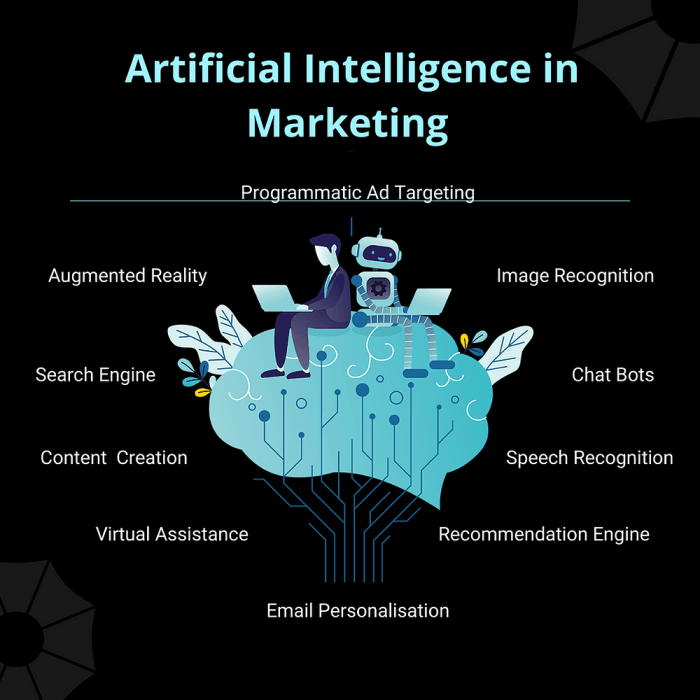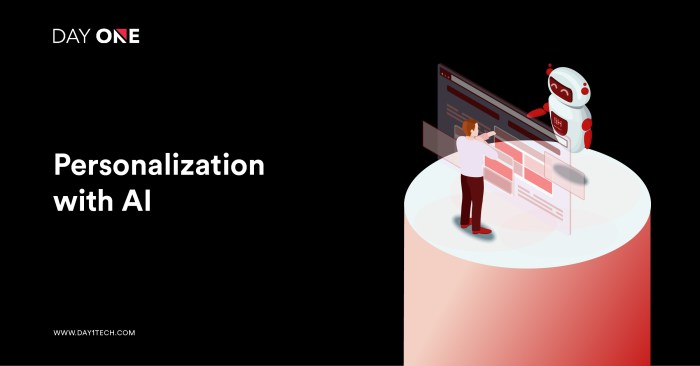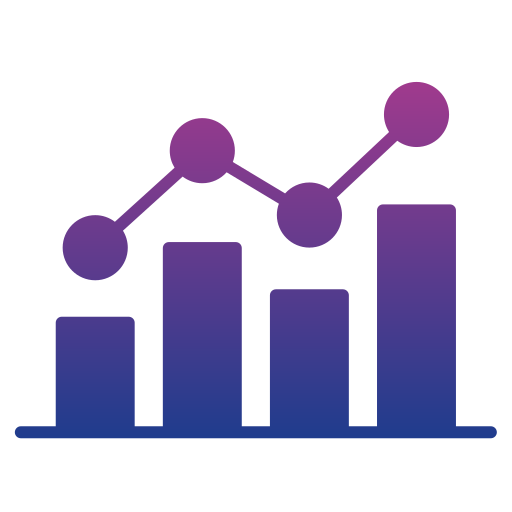AI for personalized marketing is transforming the way businesses interact with their customers. Gone are the days of generic marketing campaigns that target broad audiences. Today, AI empowers marketers to understand individual customer preferences, behaviors, and needs, enabling them to deliver highly tailored experiences that resonate deeply.
The ability to personalize marketing efforts is not merely a trend but a necessity in today’s competitive landscape. Consumers are bombarded with messages from every direction, and they’re increasingly demanding experiences that are relevant and engaging. AI provides the tools and insights to meet this demand, creating a win-win situation for both businesses and customers.
The Rise of Personalized Marketing
In the ever-evolving landscape of marketing, the shift from mass marketing to personalized approaches has been a defining trend. Personalized marketing, as the name suggests, focuses on tailoring marketing messages and experiences to individual consumers based on their unique preferences, behaviors, and needs.
This shift has been driven by several key factors, leading to a significant impact on how brands engage with their customers.
Evolution of Marketing Approaches
The evolution of marketing has witnessed a transition from mass marketing to personalized marketing. Mass marketing, prevalent in the past, involved broadcasting marketing messages to a large, undifferentiated audience. This approach lacked individualization and often resulted in low engagement and conversion rates.
Personalized marketing, on the other hand, leverages data and technology to create tailored experiences for each customer, leading to increased relevance, engagement, and ultimately, better results.
Drivers of Personalized Marketing
Several factors have fueled the rise of personalized marketing:
- Data Availability and Analytics:The proliferation of data from various sources, including online behavior, demographics, and purchase history, has empowered marketers to gain insights into customer preferences and behaviors. Advanced analytics tools enable marketers to process and interpret this data, enabling them to create personalized campaigns and experiences.
- Technological Advancements:The emergence of technologies such as artificial intelligence (AI), machine learning (ML), and automation has played a crucial role in facilitating personalized marketing. AI-powered algorithms can analyze vast amounts of data to identify customer patterns and preferences, enabling marketers to deliver personalized recommendations, content, and offers.
- Increased Customer Expectations:Consumers are increasingly demanding personalized experiences. They expect brands to understand their needs and preferences, and provide them with relevant and valuable information. This expectation has driven brands to invest in personalized marketing strategies to meet customer demands and enhance brand loyalty.
Successful Personalized Marketing Campaigns
- Amazon:Amazon, a leading e-commerce platform, is a prime example of successful personalized marketing. The platform uses AI-powered recommendation engines to suggest products based on users’ past purchases, browsing history, and search queries. This personalized approach has significantly increased sales and customer engagement.
- Netflix:Netflix, a streaming service, utilizes personalized recommendations to suggest movies and TV shows based on user preferences. The platform’s algorithm analyzes viewing history, ratings, and other data to create personalized recommendations, leading to increased user engagement and retention.
- Spotify:Spotify, a music streaming service, employs personalized playlists and recommendations based on user listening habits and preferences. This personalized approach has contributed to Spotify’s massive user base and engagement.
AI as a Catalyst for Personalization
AI has emerged as a powerful catalyst for personalized marketing, enabling businesses to tailor their messages and offers to individual customer preferences and behaviors. This revolution in marketing is driven by AI’s ability to analyze vast amounts of data, understand customer insights, and automate marketing processes.
AI Capabilities for Personalized Marketing
AI’s capabilities are crucial for delivering personalized marketing experiences. Here’s a breakdown of how AI empowers businesses to tailor their marketing strategies:
- Data Analysis and Insights:AI algorithms can analyze customer data from various sources, including website interactions, purchase history, social media activity, and demographics. This analysis helps identify patterns, preferences, and behaviors, providing valuable insights into customer needs and desires.
- Predictive Analytics:AI can predict customer behavior, such as future purchases, churn risk, and product preferences. This predictive capability allows businesses to proactively tailor their marketing efforts to address individual customer needs and anticipate their future requirements.
- Content Personalization:AI can personalize content based on individual customer preferences. This includes tailoring website content, email campaigns, and social media posts to resonate with specific customer segments. For instance, AI can recommend relevant products or services based on past purchases or browsing history.
- Customer Segmentation:AI can automatically segment customers into distinct groups based on shared characteristics and behaviors. This segmentation allows businesses to tailor their marketing messages and offers to specific customer groups, increasing the effectiveness of their campaigns.
- Real-time Personalization:AI can personalize marketing experiences in real time, adapting to changing customer preferences and behaviors. For example, AI-powered chatbots can provide personalized customer support based on individual needs and preferences, enhancing the overall customer experience.
AI-Driven Campaign Creation and Optimization
AI plays a vital role in creating and optimizing personalized marketing campaigns. AI algorithms analyze customer data to identify target audiences and develop tailored campaigns that resonate with their specific interests and needs.
- Target Audience Identification:AI algorithms can identify target audiences based on specific criteria, such as demographics, interests, and past purchase behavior. This allows businesses to focus their marketing efforts on the most receptive audiences, increasing campaign effectiveness.
- Campaign Personalization:AI can personalize campaign elements, including messaging, visuals, and offers, based on individual customer preferences and behaviors. This ensures that each customer receives a tailored experience that resonates with their unique needs and interests.
- Campaign Optimization:AI can optimize campaign performance in real time, adjusting messaging, targeting, and offers based on customer responses and campaign data. This iterative optimization process ensures that campaigns remain relevant and effective throughout their lifecycle.
AI-Powered Automation and Optimization, AI for personalized marketing
AI can automate and optimize personalized marketing efforts, freeing up marketers to focus on strategic initiatives.
AI automation streamlines repetitive tasks, such as email marketing, content creation, and campaign management, allowing marketers to focus on higher-value activities like strategy development and customer relationship building.
- Email Marketing Automation:AI can automate email marketing campaigns, sending personalized messages at the right time based on customer behavior and preferences. This includes sending welcome emails, abandoned cart reminders, and personalized product recommendations.
- Content Creation Automation:AI can generate personalized content, such as product descriptions, social media posts, and blog articles, based on customer data and preferences. This automation streamlines content creation and ensures that content is relevant and engaging for individual customers.
- Campaign Management Automation:AI can automate campaign management tasks, such as budget allocation, performance tracking, and optimization. This automation allows marketers to focus on strategic initiatives and ensure that campaigns are running efficiently and effectively.
Applications of AI in Personalized Marketing: AI For Personalized Marketing

AI-powered tools and techniques have revolutionized the way marketers approach personalization, enabling them to deliver highly targeted and relevant experiences to individual customers. These applications are transforming various aspects of marketing, from customer segmentation and targeting to email marketing and content creation.
AI-Powered Tools and Techniques
The following table showcases various AI-powered tools and techniques used in personalized marketing:
| Tool/Technique | Description | Application in Personalized Marketing |
|---|---|---|
| Natural Language Processing (NLP) | Enables computers to understand and interpret human language. | Analyzing customer reviews and feedback, understanding customer sentiment, and personalizing content based on language preferences. |
| Machine Learning (ML) | Algorithms that learn from data and improve their performance over time. | Predicting customer behavior, identifying customer segments, and recommending products or services based on past interactions. |
| Deep Learning (DL) | A subset of ML that uses artificial neural networks to analyze large datasets. | Creating personalized product recommendations, predicting customer churn, and generating personalized content. |
| Computer Vision | Allows computers to “see” and interpret images and videos. | Analyzing customer behavior in online stores, personalizing product recommendations based on visual preferences, and creating personalized advertising campaigns based on visual cues. |
| Chatbots | AI-powered conversational agents that interact with customers. | Providing personalized customer support, answering questions, and offering tailored recommendations. |
Using AI for Customer Segmentation and Targeting
AI algorithms can analyze vast amounts of customer data to identify distinct customer segments based on various factors, such as demographics, purchase history, browsing behavior, and engagement patterns. This allows marketers to tailor their marketing messages and offers to specific customer groups, increasing the effectiveness of their campaigns.
For example, an online retailer might use AI to identify customers who are highly likely to purchase a specific product based on their browsing history and previous purchases. The retailer could then target these customers with personalized ads and promotions, increasing the likelihood of a conversion.
Designing a Personalized Email Marketing Campaign
AI can be used to create highly personalized email marketing campaigns that resonate with individual customers. By analyzing customer data, AI can identify their preferences, interests, and purchase history, enabling marketers to send relevant and timely emails. For example, an AI-powered email marketing platform could analyze a customer’s purchase history and identify that they have recently purchased a new pair of shoes.
The platform could then send a follow-up email recommending complementary products, such as socks or shoe care accessories. This type of personalized email is more likely to engage the customer and drive sales than a generic email blast.
Benefits of AI-Powered Personalized Marketing
AI-powered personalized marketing offers a multitude of benefits that can significantly enhance customer engagement, boost conversion rates, and ultimately drive revenue growth. By leveraging the power of artificial intelligence, businesses can tailor their marketing efforts to individual customer preferences, leading to more impactful and effective campaigns.
Impact on Customer Engagement and Satisfaction
AI-powered personalization plays a crucial role in enhancing customer engagement and satisfaction. By understanding individual customer preferences and behaviors, businesses can deliver highly relevant and personalized experiences across various touchpoints. This includes:
- Personalized product recommendations:AI algorithms analyze past purchase history, browsing behavior, and customer demographics to suggest products that are likely to be of interest. This increases the likelihood of customers finding relevant items, leading to higher conversion rates and improved customer satisfaction.
- Targeted content and offers:AI can segment customers based on their interests, preferences, and behaviors, allowing businesses to deliver tailored content and offers. This ensures that customers receive information that is relevant to them, increasing their engagement and likelihood of making a purchase.
- Personalized communication channels:AI can optimize communication channels based on customer preferences. For example, if a customer prefers email communication, AI can ensure that they receive relevant emails, while customers who prefer social media can be targeted through relevant social media campaigns.
Potential for Increased Conversion Rates and Revenue Generation
AI-powered personalization can significantly impact conversion rates and revenue generation. By providing a more relevant and engaging customer experience, businesses can increase the likelihood of customers making a purchase. This can be achieved through:
- Improved customer targeting:AI algorithms can identify the most valuable customer segments and tailor marketing messages accordingly. This ensures that marketing efforts are focused on the most likely customers to convert, maximizing return on investment.
- Enhanced product discovery:Personalized product recommendations help customers discover new products that they might not have found otherwise. This can lead to increased sales and revenue generation, as customers are more likely to purchase items they are genuinely interested in.
- Reduced cart abandonment:AI can analyze customer behavior and identify potential cart abandonment issues. By sending personalized reminders or offering incentives, businesses can reduce cart abandonment rates and increase conversion rates.
Effectiveness of AI-Driven Personalization Compared to Traditional Marketing Methods
AI-driven personalization offers significant advantages over traditional marketing methods. While traditional marketing relies on broad targeting and generic messaging, AI enables businesses to tailor their efforts to individual customer needs. This leads to:
- Increased relevance and engagement:Personalized messages are more likely to resonate with customers, leading to higher engagement and conversion rates.
- Improved customer experience:Personalized interactions create a more positive and engaging customer experience, fostering loyalty and repeat business.
- Greater return on investment:By focusing marketing efforts on the most valuable customer segments, businesses can achieve a higher return on investment compared to traditional marketing methods.
Ethical Considerations in AI-Powered Marketing
The rise of AI in marketing has brought about significant advancements in personalization, but it also raises ethical concerns that need careful consideration. AI-powered marketing relies heavily on data, and the potential misuse of this data can have serious consequences for individuals and society as a whole.
Data Privacy and Transparency
Data privacy is a fundamental ethical concern in AI-powered marketing. AI algorithms rely on vast amounts of personal data to create personalized experiences, and the collection, storage, and use of this data must be done responsibly.
- Informed Consent:Consumers should be fully informed about the data being collected, how it will be used, and their options for opting out. Clear and concise privacy policies are crucial for ensuring transparency and user trust.
- Data Minimization:AI systems should only collect and process the data that is absolutely necessary for achieving their intended purpose. This helps to minimize the potential risks associated with data breaches and misuse.
- Data Security:Robust security measures must be in place to protect personal data from unauthorized access, use, or disclosure. This includes encryption, access controls, and regular security audits.
The Future of AI in Personalized Marketing
The future of AI in personalized marketing is brimming with possibilities, driven by the continuous evolution of AI technologies and the growing demand for personalized customer experiences. AI is poised to transform how brands interact with their customers, creating a more tailored and engaging journey.
The Impact of Emerging Technologies
The emergence of advanced technologies like Natural Language Processing (NLP) and Computer Vision will significantly impact personalized marketing strategies.
- NLP will enable AI to understand and interpret human language with greater accuracy, leading to more sophisticated personalized content creation, customer service interactions, and targeted advertising.
- Computer Vision will allow AI to analyze visual data, such as images and videos, providing valuable insights into customer behavior and preferences. This will enable brands to create personalized experiences based on visual cues, such as product recommendations based on clothing styles or personalized advertisements based on visual content consumption.
AI Shaping the Customer Experience
AI will continue to shape the customer experience in the years to come by:
- Predictive Analytics:AI will leverage historical data and real-time information to predict customer behavior, allowing brands to anticipate needs and provide proactive solutions. For example, AI-powered systems can predict customer churn, identify potential upselling opportunities, and personalize product recommendations based on individual preferences.
- Hyper-Personalization:AI will enable hyper-personalization by tailoring experiences to individual customers at an unprecedented level. This could involve dynamic pricing based on individual purchase history, personalized product recommendations based on browsing behavior, and customized content based on demographics and interests.
- AI-Powered Customer Service:AI-powered chatbots and virtual assistants will provide instant and personalized support to customers, resolving queries, offering guidance, and automating routine tasks. This will enhance customer satisfaction and free up human agents to focus on more complex issues.
- Contextual Marketing:AI will enable brands to deliver contextually relevant marketing messages across different channels, such as websites, mobile apps, and social media. This will ensure that marketing efforts are aligned with customer needs and interests, increasing engagement and conversion rates.
Summary

As AI continues to evolve, its impact on personalized marketing will only grow stronger. We can expect to see even more sophisticated tools and techniques emerge, enabling marketers to deliver truly personalized experiences that anticipate customer needs and desires. This will lead to increased customer satisfaction, loyalty, and ultimately, business success.
By embracing AI, marketers can unlock a new era of personalized engagement, forging deeper connections with their customers and driving lasting results.
Common Queries
How does AI personalize marketing campaigns?
AI algorithms analyze vast amounts of customer data, including browsing history, purchase behavior, demographics, and interactions with marketing materials. This data is used to create detailed customer profiles, allowing marketers to tailor messages, offers, and content to individual preferences.
What are some examples of AI-powered marketing tools?
Popular tools include recommendation engines that suggest products based on past purchases, chatbots that provide personalized customer support, and dynamic pricing algorithms that adjust prices based on individual customer behavior.
What are the ethical considerations of AI in marketing?
It’s crucial to ensure that AI-powered marketing is used responsibly and ethically. This includes protecting customer data privacy, avoiding discriminatory targeting, and maintaining transparency in how AI is used to personalize experiences.
